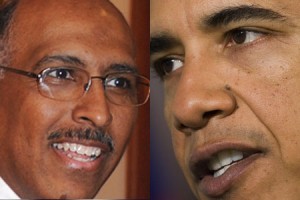(ThyBlackMan.com) A face-to-face encounter back in 2005 between a senator from Illinois and a Maryland lieutenant governor might have brought us closer to the post-partisan solutions that candidate Obama promised…
Critics of President Barack Obama have plenty of political fodder, both legitimate and unfair, to knock the administration during these pressing times. However, one of my biggest disappointments with the Obama White House so far does not have its origins in Obamacare or the failed stimulus package.
Instead, it stems back to the promise that came up during the 2008 presidential election. Candidate Obama — with eloquence rarely found in  politics — promised the nation that he would move past the partisanship that often creates gridlocks in Congress, a phenomenon that really kicked into gear once the Democrats regained control of Congress during the second George W. Bush term in November 2006.
politics — promised the nation that he would move past the partisanship that often creates gridlocks in Congress, a phenomenon that really kicked into gear once the Democrats regained control of Congress during the second George W. Bush term in November 2006.
With the emergence of the first African-American president (in the truest sense), there was a legitimate belief among many Americans that our politics would change forever — from the possible regression of the Republican Party into irrelevance to the potential for post-partisanship in government.
The promise of building those bridges has been lost — but not just over the last two years as the Obama-led Democrats have railroaded legislation through Congress. The signs that this promise was more of a mirage than anything else go back to 2005.
During the civil rights era, many black Americans — and many scholars later on — wondered how history might have changed if Malcolm X and Martin Luther King Jr. had joined forces to advance the issues affecting black Americans at that time. A “gentlemen’s understanding” could have shaken injustice, saved America from years of bloodshed — and spared those two brave men from assassination.
Of course, King and Malcolm X did meet once, briefly, in 1964. Playwrights and novelists have speculated on what they may have talked about and how they may have found points of agreement. But Malcolm was killed a year later, and King was gone three years after that.
Maybe in some 21st-century manner, a meeting between Obama and RNC Chairman Michael Steele — as early as 2005, when then-Maryland Lt. Gov. Steele first extended the invitation to the brand-new Sen. Obama — could have helped Americans find inspiration for better days politically and socially, and spared these two men the character assassinations that they have endured.
Perhaps Obama knew back then that he would be taking the presidential path and, therefore, did not feel that the invitation extended by Steele would benefit his political career. And considering the rabid nature of politics, he may have been right. However, one has to wonder what the impact such a meeting even now could have on the civility of politics — and on the psyches of black folks.
Hoover Institution scholar Shelby Steele (no relation to the RNC chairman) says that a meeting would not be a factor in improving conditions in black America. “The symbolism of a black man in the White House just doesn’t carry,” he says. I disagree. A friendship or — at the very least — a meeting at which a common level of respect was established could go a long way toward re-establishing the moral authority and political confidence that our leaders are sorely lacking in today’s America.
Instead of taking the leap of faith to sit down with the nation’s only standing black lieutenant governor at that time (one who resided in Obama’s new political backyard to boot), Sen. Obama kicked aside the chance to be a historical leader, perhaps to focus on being a historical candidate. That rejection may have been a small but important footnote in costing us a chance to launch a new era of decorum between Democrats and Republicans.
Less than four years after that initial invitation, both Obama and Steele elevated their careers in an unexpected way. They both arrived at places where the crossroads of history-making elections and crisis-building situations afforded them a chance to take politics in a different direction. Instead, partisanship — or perhaps arrogance and indifference to historical obligations — got in the way.
Sadly, the verbal gaffes, financial woes and political melees since 2009 have made it a virtual certitude that such a meeting of two important political leaders will never take place. Sadder still, a golden opportunity for black leaders to meet and make history — and set a higher standard for positive change in America — was lost in the process, just as it was more than 45 years earlier.
Written By Lenny McAllister

















Leave a Reply